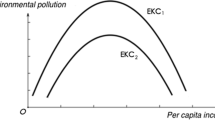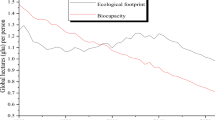Abstract
This study examines how different forms of greenhouse gases affect happiness, along with other socioeconomic and demographic variables. The study uses a panel data analysis to investigate the relationship between happiness and greenhouse gases for 95 countries, spanning the period 1990–2015. The empirical analysis is based on different measures of greenhouse gases, such as carbon dioxide emissions (CO2), nitrous oxide (N2O), methane (CH4), and total greenhouse gases (GHG). The empirical results document that greenhouse gases have a strong negative impact on happiness. All forms of greenhouse gases adversely impact cross-national happiness. This study concludes that greenhouse gases are a significant source of lowering cross-national happiness levels, while economic affluence is improving life satisfaction. The findings remain robust to different specifications, alternative estimation methods, and additional control variables. The findings offer certain important policy implications, such as policymakers in these countries need to invest more in green technologies and green spaces to enhance their supply and accessibility.
Similar content being viewed by others
References
Alesina A, Di Tella R, MacCulloch R (2004) Inequality and happiness: are Europeans and Americans different? J Public Econ 88(9):2009–2042
Arellano M, Bond S (1991) Some tests of specification for panel data: Monte Carlo evidence and an application to employment equations. Rev Econ Stud 58(2):277–297
Arellano M, Bover O (1995) Another look at the instrumental variable estimation of error-components models. J Econ 68(1):29–51
Bond S, Bowsher C, Windmeijer F (2001) Criterion-based inference for GMM in autoregressive panel data models. Econ Lett 73(3):379–388
Brereton F, Clinch JP, Ferreira S (2006) Happiness, geography and the environment. Ecol Econ 65:386–396
Burke PJ, Shahiduzzaman M, Stern DI (2015) Carbon dioxide emissions in the short run: the rate and sources of economic growth matter. Glob Environ Chang 33:109–121
California Energy Commission (2003) Windows and offices: a study of office worker performance and the indoor environment, Technical Report P500-03-082-A-9. Fair Oaks, California
Carson R (1962) Silent spring. Penguin, Harmondsworth
Clark AE, Oswald AJ (1994) Unhappiness and unemployment. Econ J 104(424):648–659
Daly HE (1987) The economic growth debate: what some economists have learned but many have not. J Environ Econ Manag 14(4):323–336
DeLucia EH, Casteel CL, Nabity PD, O'Neill BF (2008) Insects take a bigger bite out of plants in a warmer, higher carbon dioxide world. Proc Natl Acad Sci 105(6):1781–1782
Duroy MQ (2005) The determinants of environmental awareness and behavior. In: Working Papers in Economics # 0501. Denison University, United States
Easterlin RA (1974) Does economic growth improve the human lot? Some empirical evidence. Nations househ Econ Growth 89:89–125
Easterlin RA (1995) Will raising the incomes of all increase the happiness of all? J Econ Behav Organ 27:35–47
Easterlin RA (2005) Feeding the illusion of growth and happiness: a reply to Hagerty and Veenhoven. Soc Indic Res 74(3):429–443
Easterlin RA, Angelescu L, Zweig JS (2011) The impact of modern economic growth on urban–rural differences in subjective well-being. World Dev 39(12):2187–2198
Easterlin RA, McVey LA, Switek M, Sawangfa O, Zweig JS (2010) The happiness–income paradox revisited. Proc Natl Acad Sci 107(52):22463–22468
Fanning AL, O'Neill DW (2019) The wellbeing–consumption paradox: happiness, health, income, and carbon emissions in growing versus non-growing economies. J Clean Prod 212:810–821
Ferrer-i-Carbonell A, Gowdy JM (2007) Environmental degradation and happiness. Ecol Econ 60:509–516
Gardner J, Oswald A (2001) Does money buy happiness? A longitudinal study using data on windfalls. Manuscript submitted for publication
Greene WH (1997) Econometric analysis. Pearson, New York
Hagerty MR, Veenhoven R (2003) Wealth and happiness revisited–growing national income does go with greater happiness. Soc Indic Res 64(1):1–27
Hickel J, Kallis G (2019) Is green growth possible? New Polit Econ:1–18
Hirsch F (1976) Social limits to growth. Harvard University Press, New York
Inglehart R (1995) Public support for environmental protection: objective problems and subjective values in 43 societies. Polit Sci Polit 28(01):57–72
IPCC (2011) Summary for policymakers. IPCC Special report on renewable energy sources and climate change mitigation. Cambridge University Press, Cambridge
IPCC (2014) Climate change 2014, synthesis report. IPCC, Geneva Retrieved from: http://www.ipcc.ch/pdf/assessmentreport/ar5/syr/SYR_AR5_FINAL_full_wcover.pdf
IPCC (2018) Global warming of 1.5 °C, special report. IPCC, Geneva
Kallis G, Kostakis V, Lange S, Muraca B, Paulson S, Schmelzer M (2018) Research on degrowth. Annu Rev Environ Resour 43:291–316
Kellert S, Wilson EO (1983) The biophilia hypothesis. Island Press, Washington
Khan S, Majeed MT (2019) Decomposition and decoupling analysis of carbon emissions from economic growth: a case study of Pakistan. Pak J Commer Soc Sci 13(4):868–891
Kim YO, Kim J (2016) A comparative study on relationship of spatial configuration and suicide rate between high-rise apartments of social housings and shanty towns. J Urban Des Instit Korea 17(1):135–146
Laaksoharju T, Rappe E (2017) Trees as affordances for connectedness to place–a framework to facilitate children’s relationship with nature. Urban For Urban Green 28:150–159
Lele FF (2013) Happiness and the environment: finding out a relationship. (Master’s dissertation in environmental economics and management), University of Porto. Available at: https://core.ac.uk/download/pdf/143393345.pdf
Lenzen M, Cummins RA (2013) Happiness versus the environment—a case study of Australian lifestyles. Challenges 4:56–74
Li F, Zhou T (2020) Effects of objective and subjective environmental pollution on well-being in urban China: a structural equation model approach. Soc Sci Med 112859
Lohmann P, Pondorfer A, Rehdanz K (2019) Natural hazards and well-being in a small-scale island society. Ecol Econ 159:344–353
MacKerron G, Mourato S (2009) Life satisfaction and air quality in London. Ecol Econ 68(5):1441–1453
Majeed MT, Ozturk I (2020) Environmental degradation and population health outcomes: a global panel data analysis. Environ Sci Pollut Res:1–11
McMichael AJ (2003) Global climate change and health: an old story writ large. Climate change and human health: risks and responses. World Health organization, Geneva
Mkrtchyan GM, Blam IY, Kovalev SY, Tsvelodub YO (2018) Impact of climate change on the subjective well-being of households in Russia. Reg Res Russ 8(3):281–288
Morawetz D, Atia E, Bin-Nun G, Felous L, Gariplerden Y, Harris E, Zarfaty Y (1977) Income distribution and self-rated happiness: some empirical evidence. Econ J 87(347):511–522
Pritchard A, Richardson M, Sheffield D, McEwan K (2019) The relationship between nature connectedness and eudaimonic well-being: a meta-analysis. J Happiness Stud:1–23
Puhakka R, Pitkänen K, Siikamäki P (2017) The health and well-being impacts of protected areas in Finland. J Sustain Tour 25(12):1830–1847
Rantala O, Puhakka R (2019) Engaging with nature: nature affords well-being for families and young people in Finland. Children's Geogr:1–14
Rehdanz K, Maddison D (2005) Climate and happiness. Ecol Econ 52(1):111–125
Scitovsky T (1976) The joyless economy: an inquiry into human satisfaction and consumer dissatisfaction. J Consum Aff 11(2):147–149
Sekulova F, Van den Bergh JCJM (2016) Floods and happiness: empirical evidence from Bulgaria. Ecol Econ 126(C):51–57
Steinberger JK, Krausmann F, Getzner M, Schandl H, West J (2013) Development and dematerialization: an international study. PLoS One 8(10):e70385
Tiwari AK (2011) Happiness and environmental degradation: what determines happiness? Econ Bull 31(4):3192–3210
Tukker A, Emmert S, Charter M, Vezzoli C, Sto E, Andersen MM, Geerken T, Tischner U, Lahlou S (2008) Fostering change to sustainable consumption and production: an evidence based view. J Clean Prod 16:1218–1225
Ulrich R (1984) View through a window may influence recovery. Science 224(4647):224–225
United Nations Office for Disaster Risk Reduction Report (2004) “ISDR: terminology”, The International Strategy for Disaster Reduction, 2004-03-31
Veenhoven R (1991) Is happiness relative? Soc Indic Res 24(1):1–34
Veenhoven R (2016) World database of happiness. Erasmus University Rotterdam, The Netherlands
Welsch H (2003) Environment and happiness: valuation of air pollution in ten European countries (No. 356). DIW Discussion Papers
Westerlund J (2007) Testing for error correction in panel data. Oxf Bull Econ Stat 69(6):709–748.
White MP, Alcock I, Wheeler BW, Depledge MH (2013) Would you be happier living in a greener urban area? A fixed-effects analysis of panel data Psychological Science, 0956797612464659
Wilson EO (1984) Biophilia. Harvard University Press, Cambridge
World Bank (2016) World development indicators. Retrieved from The World Bank: http://data.worldbank.org/indicator
World Health Organization (2016) The World Health Report 2016: Mental health: climate change and health. World Health Organization
Zander KK, Moss S, Garnett ST (2019) Climate change–related heat stress and subjective well-being in Australia. Weather Clim Soc 11(3):505–520
Availability of data
Data sources are clearly mentioned. Interested person can access the data. Besides, the datasets generated during and/or analyzed during the current study are available from the corresponding author on reasonable request.
Author information
Authors and Affiliations
Corresponding author
Ethics declarations
Human participants and/or animals
The authors declare that their research does not involve human participants and/or animals.
Conflict of interest
The authors declare no competing interests.
Additional information
Publisher’s note
Springer Nature remains neutral with regard to jurisdictional claims in published maps and institutional affiliations.
Appendix
Appendix
Rights and permissions
About this article
Cite this article
Apergis, N., Majeed, M.T. Greenhouse gas emissions and cross-national happiness: a global perspective. Air Qual Atmos Health 14, 1289–1300 (2021). https://doi.org/10.1007/s11869-021-01019-5
Received:
Accepted:
Published:
Issue Date:
DOI: https://doi.org/10.1007/s11869-021-01019-5




